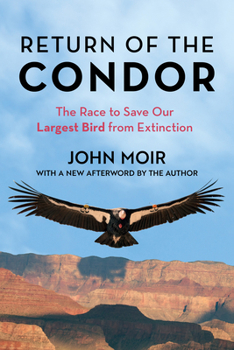Return of the Condor: The Race to Save Our Largest Bird from Extinction
Select Format
Select Condition 
Book Overview
"A heart-stopping saga of the rescue from the very brink of extinction of one of the grandest of all birds."--Thomas Lovejoy, president of the Amazon Biodiversity Center.
RETURN OF THE CONDOR is the riveting account of one of the most dramatic attempts to save a species from extinction in the history of modern conservation. Features a new Afterword by the author.
With the condor's population down to only twenty-two birds in the 1980s and their very survival in doubt, the condor recovery team flouted conventional wisdom and pursued a controversial strategy to pull the bird back from the brink of extinction. Thus began the ongoing, decades-long program to reestablish America's largest bird in its ancient home in Western skies.
Award-winning science writer John Moir takes readers into the backcountry to get to know the recovery program scientists as well as some of the individual condors. These are stories of peril, uncertainty, and controversy. Woven throughout these tales of heartbreak and triumph is the extraordinary dedication of the humans who have sometimes risked their lives for this charismatic, intelligent, and social bird.
Despite the program's remarkable successes, the condor's narrative is still unfolding with a number of challenges remaining. This includes the dilemma of lead poisoning among free-flying condors that is a major obstacle to the bird's recovery.
The new Afterword presents a compelling examination of the progress and continuing adversity facing the condor recovery effort since the first edition of the book was published.
Finalist for the William Saroyan International Writing Prize
from the Stanford University Libraries
Honorable Mention from the National Association of Science Writers
Related Subjects
Birdwatching Conservation Endangered Species Nature Nature & Ecology Ornithology State & Local Zoology




